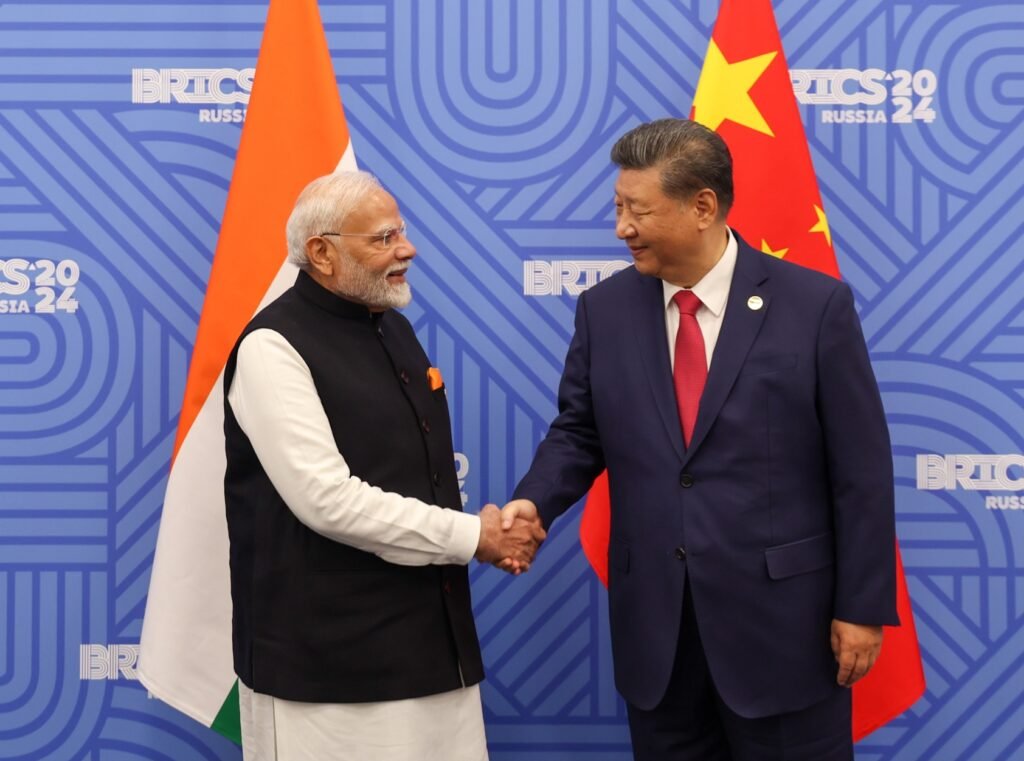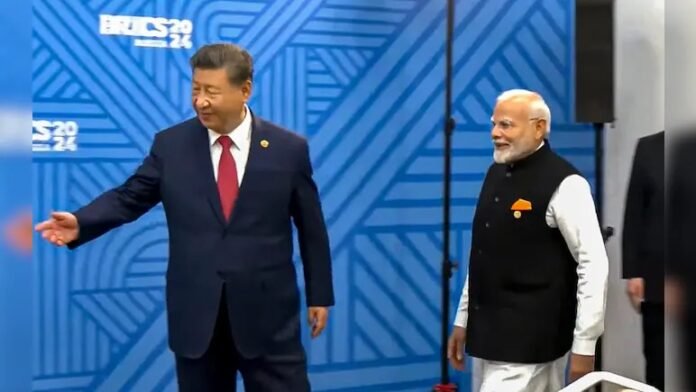BRICS Summit 2024: On October 23, 2024, in Kazan, India and China held their first bilateral talks in five years on the sidelines of the BRICS summit. Both sides expressed satisfaction after the discussions, which had been carefully prepared through prior agreements between their armies, emphasizing the restoration of trust. Experts view this meeting as a major diplomatic victory for India, driven by the Modi government’s persistent efforts on various international platforms in recent months. The talks are seen as a result of the strategic pressure India applied, forcing China into negotiations. This meeting marks a significant step in improving relations between the two nations, with China’s economic struggles, including rising unemployment and slowing growth, adding to the reasons for their willingness to engage with India.
Table of Contents
After this conversation, PM Modi wrote on the social media site X that he met President Xi Jinping on the sidelines of the BRICS Summit in Kazan, Russia. Apart from the people of both the countries, India-China relations are important for regional and global peace and stability. Mutual trust, respect and sensitivity will show the way to the bilateral relations of the two countries.
PM Modi Sends Clear Signals to China Again
Through this conversation, the Prime Minister gave many signals to China. If you pay attention to his words, you will find that these are the same words that have been continuously used by India on many platforms regarding China.
1- There should be peace on the border:
With this statement, PM Modi has indirectly told China that the relations will remain deep and lasting only when China stops its activities on the border. The issue of restoring peace on the border is related to the armies of both the countries and it will be implemented only when China is ready to follow the agreements of LAC.
2- Each other’s sensitivities should be respected:
PM Modi attacked China’s policies regarding India with this line. China keeps creating hurdles on international forums. China has saved Pakistani terrorists from being included in the global terrorist list in UNSC many times.
3- Promoting mutual trust and cooperation:
For a long time, India was a market for China. In the last few years, China’s trade has declined because India has been expecting better cooperation from China in return. PM Modi drew attention to this in his talks with China.
4- Mutual trust:
The strongest point that is being constantly raised by India is mutual trust. China has broken India’s trust many times. This point has been raised prominently by India in every kind of conversation including with PM Modi.

Xi Jinping agreed ‘in principle’ to Modi’s suggestions
Chinese President Xi Jinping on Wednesday agreed “in principle” to suggestions made to improve India-China relations during a meeting with Prime Minister Narendra Modi here, state news agency Xinhua reported. According to the report, in his meeting with Prime Minister Modi on the sidelines of the 16th BRICS summit in the Russian city of Kazan, Jinping said that China-India relations are basically about how two large developing and neighbouring countries with a population of 1.4 billion treat each other.
Xi said China and India should maintain a solid strategic perception of each other and the two big neighbours should work together to find a “correct and bright path” for living in harmony and developing together.
The two leaders appreciated the recent significant progress made by both sides through intensive dialogue to resolve issues in the border areas. “Modi made suggestions to improve and develop relations, to which Xi agreed in principle,” Xinhua news agency reported.
What is PM Modi’s 3M?
In the talks with China, the Prime Minister emphasized on 3 M. Let’s know what these 3 M are.
- Mutual Trust
- Mutual Respect
- Mutual Sensitivity
What were the main discussions in the BRICS conference
- Digital connectivity will be promoted. It has been decided to promote effective global governance of artificial intelligence and support the important role of the United Nations in this.
- More funds are expected for developing countries in the upcoming climate conference.
- The existing New Development Bank (NDB) of the BRICS countries will be developed as a new development bank. NDB will give more loans in local currency.
- Western sanctions have been described as illegal and unilateral, and concerns have also been raised about their impact on the global economy and international trade.
- Supported the BRICS Vaccine Centre to prevent global pandemic. Took note of India’s initiative to form the International Big Cat Alliance.
- Concern over rising levels of global debt. Identifying it as a global problem, demanding implementation of the G-20 framework to address it comprehensively.
- Support for removing existing barriers in international trade and applying them equally to every country.
- Instructions to the Finance Ministers and Central Banks of the member countries to study the new system of transactions and payments in local currency and submit a report in the next meeting.

China didn’t easily extend a hand to PM Modi—understand the full chronology behind this shift
PM Modi and Xi Jinping’s first bilateral talks in five years reflect India’s diplomatic victory, with China seemingly pressured into negotiations after India’s strategic moves on various international platforms.
India ignored on the international stage
If China was ready to talk to India after five years, then the biggest reason behind this was India’s diplomatic move, in front of which China was defeated. In fact, in the last few months or rather in the last one year, India has surrounded China from Quad to ASEAN and other international forums and criticized its expansionist policies. Along with this, not only opposed its policies itself but also got it criticized by other countries. Due to this strategy of India, China started getting isolated in the international community. China felt that if things were not corrected in time, then it would have to suffer the consequences on a large scale.
China is worried about its economy being affected
China may or may not accept it publicly, but the truth is that the siege of India for some time has also affected the economy of China. The way India has given a piece of its mind to China on various platforms, China is looking isolated. And it is also facing the loss of its aggressive image in trade. For some time, China’s economy has been facing slow growth rate, rising unemployment and real estate crisis. China’s economy, which has the second largest economy in the world, has been going through a bad economic condition for some time. This decline started from last year itself. Which is continuing this year as well. In such a situation, China cannot harm its economy further by bearing the displeasure of other countries including India.
From Quad to ASEAN, when India gave a piece of its mind to China
PM Modi attended the Quad Summit during his US visit last month. His visit proved to be special for India in many ways. On this visit, while PM Modi completed many important defense deals, he also gave a direct message to China in gestures. During this conference, India has surrounded China from all sides. This is the reason that during this conference, all the leaders also expressed their serious concern about the activities that forcibly create fear in the South China Sea. India also told China in the ASEAN conference. India criticized China’s expansionist policy in the ASEAN conference and emphasized on establishing peace with neighboring countries.
S Jaishankar also told China bluntly
Foreign Minister S Jaishankar had given a blunt reply to Pakistan and China in the past. Addressing the SCO meeting, S Jaishankar had said that if cross-border activities are based on the three evils of terrorism, extremism and separatism, then cooperation in areas like trade, energy and connectivity is unlikely to increase. Jaishankar had further said that there is a need to introspect whether the spirit of good neighbor is missing and there is a lack of trust. He said that territorial integrity and sovereignty should be recognized in trade and connectivity initiatives and it is necessary to have an “honest dialogue” on the lack of trust.
Also read:

